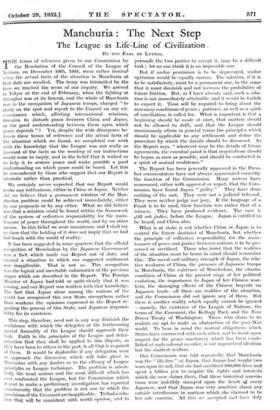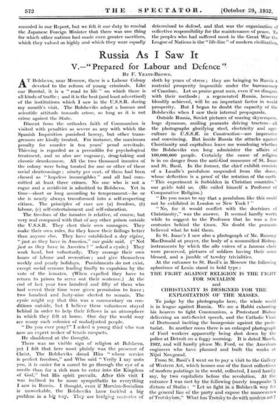Manchuria : The Next Step
The League as Life-Line of Civilization .
BY THE EARL OF LYTTON.
THE terms of reference given to our Commission by the Resolution of the Council of the League of Nations, on December 10th, 1931, seem rather ironical when the actual facts of the situation in Manchuria at that date are recalled. The irony was intensified by the time we reached the scene of our inquiry. We arrived in Tokyo at the end of February, when the fighting at Shanghai was at its fiercest, and the whole of Manchuria was in the occupation of Japanese troops, charged " to study on the spot and report to the Council on any cir- cumstances which, affecting international relations, threaten to disturb peace between China and Japan, or the good understanding between them upon which peace depends " ! Yet, despite the wide divergence be- tween these terms of reference and the actual facts of the situation which we found, we completed our work with the knowledge that the League was not really as ignorant of the facts as the wording of our instructions would seem to imply, and in the belief that it wished us to help it to restore peace and make possible a good understanding on which peace could be based. Let this be remembered by those who suggest that our Report is idealistic rather than practical.
We certainly never expected that our Report would evoke any enthusiasm, either in China or Japan. Neither did we believe that a permanent solution of the Man- churian problem could be achieved immediately, either by our proposals or by any other. What we did believe was that a solution could be found within the framework of the system of collective responsibility for the main- tenance of peace throughout the world, and by no other means. In this belief we were unanimous, and I shall try to show that the holding of it does not imply that we had lost touch with the world of reality.
It has been suggested in some quarters that the official recognition of Manchukuo by the Japanese Government was a fact which made our Report out of date, and created a situation to which our suggested settlement was inapplicable. That is not so. This recognition was the logical and inevitable culmination of the previous stages which are described in the Report. The Foreign Minister of Japan had told us quite clearly that it was coming, and our Report was written with that knowledge. The fact that Japan alone among the nations of the world has recognized this new State strengthens rather than weakens the opinions expressed in the Report re- garding the genesis of this State, and Japanese responsi- bility for its existence.
This step, therefore, need not in any way diminish the confidence with which the delegates at the forthcoming special Assembly of the League should approach their task. Faith in the principles of the League and deter- mination that they shall be applied to this dispute, as they have been to others in the past, is all that is required of them. It would be deplorable if any delegation were to approach the discussion which will take place in November with any doubts as to the efficacy of League principles or League technique. The problem is admit- tedly the most serious and the most difficult which has ever confronted the League, but the Commission which it sent to make a preliminary investigation has reported unanimously that the problem is not one to which the Provisions of the Covenant are inapplicable. To find a solu- tion that will be consistent with world opinion, and to persuade the two parties to accept it, may be a difficult task ;- let no one think it is an impossible one.
But if undue pessimism is to be deprecated, undue optimism would be equally unwise. The solution, if it is to be satisfactory, must be a permanent one, in the sense that it must diminish and not increase the probability of future friction. But, as I have already said, such a solu- tion is not immediately attainable, and it would be foolish to expect it. Time will be required to bring about the necessary conditions of peace ; patience, as well as a spirit of conciliation, is called for. What is important is that a beginning should be made at once, that matters should not be allowed to drift, and that the League should unanimously affirm in general terms the principles which should be applicable to any settlement and define the procedure by which the details should be discussed. As the Report says, " whatever may be the details of future agreements, the essential point is that negotiations should be begun as soon as possible, and should be conducted in a spirit of mutual confidence."
The Report has been generally approved in the Press, but commentators have not always appreciated correctly the function of the Commission. Many writers have announced, either with approval or regret, that the Com- mission have found Japan " guilty." They have done nothing of the sort. They were not a judicial tribunal. They were neither judge nor jury. If the language of a Court is to be used, their function was rather that of a witness. They have produced evidence. The ease is still sub judice, before the League. Japan is entitled to be heard, and China also.
What is at stake is not whether China or Japan is to control the future destinies of Manchuria, but whether the principle of collective responsibility for the main- tenance of peace and justice between nations is to be pre- served or sacrificed. Those who insist that the realities of the situation must be borne in mind should remember this. The naval and military strength of Japan, the rela- tive weakness of China, the presence of Japanese troops in Manchuria, the existence of Manchukuo, the chaotic condition of China at the present stage of her political evolution, the importance to Japan of her Chinese mar- kets, the damaging effects of the Chinese boycott on Japanese trade—all these are realities of the situation, and the Commission did not ignore any of them. But there is another reality which equally cannot be ignored —namely, the existence of the League of Nations, the terms of the Covenant, the Kellogg Pact, and the Nine Power Treaty of Washington. Those who claim to be realists are apt to make an abstraction of the post-War World. To bear in mind the mutual obligations which States have contracted with each other, and to insist upon respect for the peace machinery which has been estab- lished at such colossal sacrifice, is not unpractical idealism but the starkest realism.
Our Commission was told repeatedly that Manchuria was the " life-line " of Japan, that Japan had fought two wars upon its soil, that she had sacrificed 200,000 lives and spent a billion yen to acquire the rights and interests which she now claims there, that these historical associa- tions were indelibly stamped upon the heart (it every Japanese, and that Japan was very sensitive about any outside interference in matters which she claimed to be her sole concern. All this we accepted and have duly recorded in our Report, but we felt it our duty to remind the Japanese Foreign Minister that there was one thing for which other nations had. made even greater sacrifices, which they valued as highly and which they were equally determined to defend, and that was the organization of collective responsibility for the maintenance of peace. To the peoples who had suffered most in the Great War the Leagne of Nations is the " life-lirie " of modern civilization.













































 Previous page
Previous page